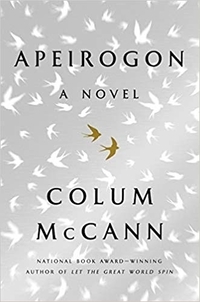New Waves by Kevin Nguyen
 Monday, March 9, 2020 at 7:44AM
Monday, March 9, 2020 at 7:44AM 
Published by Random House/One World on March 10, 2020
A young woman named Margo is hit by a car and dies. She is something of a phantom character for the rest of New Waves, carried in memory by two of her friends who bond with each other through their discovery that they both knew her.
Margo had dark skin and a Haitian background. She worked as a software engineer. She could see patterns that others missed. Often at night, because she “was happiest when she was drinking,” she got buzzed and dictated short science fiction stories, typically in dystopian settings, into her phone. A few of those stories appear in New Waves.
Margo had few friends, but she developed two friendships online. One was on a website that archived music (not entirely in conformity with copyright laws). She was a fan of Japanese music. She traded music with Lucas Nguyen, who is a fan of bossa nova.
By coincidence, at some point after the music website is shut down, Lucas and Margo discover that they are both working at the same messaging app company — Margo in development, Lucas in customer service. They eventually leave the company and go to work for a different messaging app company (Phantom), a startup developing an app that allows covert messaging. The app is intended for whistleblowers but is embraced by teens who use it for sexting. The perils of working for (or doing business with) a tech company, particularly a startup, is a theme to which the story frequently returns.
As a lark (or so it seems to Lucas), before quitting and moving to Phantom, they steal some user data, prompting an eventual discussion of the morality of stealing from a company that doesn’t care about its employees. Margo does it to get back at all the male employees who don’t take her seriously because she’s a woman, and all the white employees who want to discuss hip-hop with her. Lucas does it to get back at all the non-Asian employees who assume he’s an engineer because he’s Asian, and all the Asian employees who look down on him because he’s not an engineer. Margo is particularly offended when a survey finds that the app appeals to nonwhite users, and the company instantly focuses on making the app more “white friendly” rather than working on features that would appeal to its black customer base.
All of that gives a taste of the carefully consructed background to New Waves. The story really begins with the introduction of Jill August, Margo’s other online friend. Jill wrote a novel, sort of a downbeat family drama, that found a publisher. She began working on a book with a science fiction setting and joined a science fiction message board to get a sense of the genre. There she met Margo, who critiqued Jill’s writing.
Lucas takes it upon himself to close Margo’s Facebook account, where he discovers unanswered messages from Jill. He lets Jill know that Margo died, and they eventually meet and begin something that might be a friendship-with-benefits or a deeper relationship, depending on their changing perspectives.
New Waves is an engaging novel on several fronts. Lucas’ relationships with Margo and Jill are complex. Both involve something that might be love, although it is clear that neither Margo nor Jill feel about Lucas the way he feels about them. Lucas’ assumption that Margo doesn’t want to have an intimate relationship with him because she doesn’t want to be intimate with anyone sets up a surprising revelation — surprising, at least, to Lucas, but foreshadowed to the reader.
Different approaches to confronting (or ignoring) racism and sexism are a key theme. Another is the difficulty of connecting with people. All the technology that connects us, the novel suggests, might paradoxically push us away from each other in the offline world.
Another theme is the human desire to fix things — relationships, ourselves, other people — even when they might not be fixable, or might not need fixing at all. One of the characters thinks that “all we need to do is trust that time and space sort everything out.”
But the novel’s larger message is that having a certain kind of friend can change your life in profound ways. Even after your friend dies, even if the friendship was brief, an honest friend who calls you on your bullshit, who inspires you to see the world in a different way, can guide your future. “What would Margo think about this?” is a question that Lucas constantly asks. He imagines answers that make him a better person, the kind of person Margo would admire.
New Waves is a surprisingly quick and easy read, given the complexity of the themes it explores. The characters are young, still finding their way into the adult world, trying to make sense of their lives. Kevin Nguyen writes with empathy and compassion as he steers his characters through a multi-layered story that, despite its subject matter, never becomes maudlin or preachy.
RECOMMENDED



